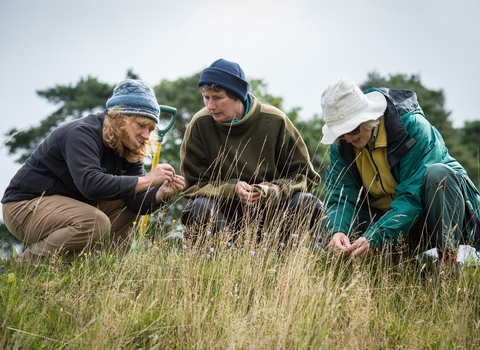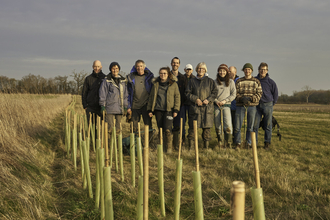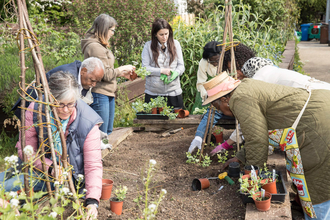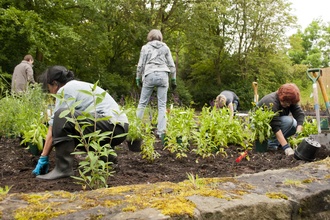Tools for communities
We’re pleased to be able to offer our selection of 'Wildlife Recording Kits' - boxes filled with surveying equipment to help you undertake species monitoring surveys on your sites and in your community spaces. These kits can help you to understand what wildlife exists on your patch, enabling you to make more informed management decisions that benefit wildlife.
For further details on borrowing the SWT Pirbright kit, please refer to our Hire agreement.
Once you have completed your surveys, there’s a number of things you can do:
- Please report your sightings to Surrey Biodiversity Information Centre (SBIC) to help us gain important information on the distribution and abundance of species and habitats across the County.
- We often run courses that can enhance your knowledge about species here in Surrey, and habitats. You can register to attend the courses to further develop your knowledge: Surrey Wildlife Trust’s Adult Learning Courses. We currently offer a limited number of FREE places to Surrey-based community groups, who are signed up to our Wilder Communities programme,
Our kit list
We currently have the following kits available.
Trail Camera
This kit provides you with a trail camera that can be set up to observe the wildlife on your site and to spot animals you may not have noticed before. It is fantastic for spotting badgers, foxes, hedgehogs, birds, mice and much more!
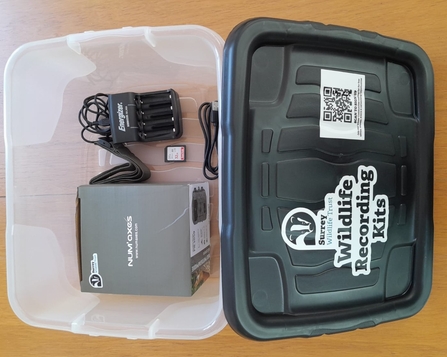
Download/print the guide for safe usage:
Download/print the Risk Assessment Template to adapt for your own use:
What's next?
Having captured what is on your site, you can use this information to help you decide what to do next.
Bats
This kit provides you with a bat detector which is designed to pick up the echolocation calls of the bats. This detector will let you know if bats are present, but may not be able to help identify the species. A number of our bat species are important indicators that can tell us about the health of our ecosystem. Changes in population numbers can indicate when there are declines in insects, or when habitats are poorly managed or destroyed (https://www.bats.org.uk).
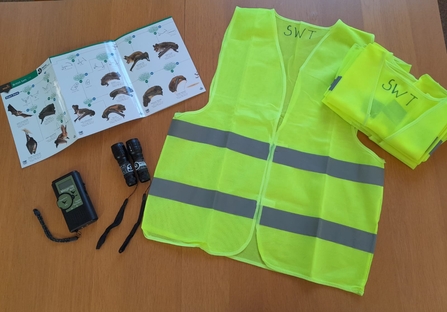
Download/print the guide for safe usage:
Download/print the Risk Assessment Template to adapt for your own use:
Download/print the User Manual:
What's next?
- If you have identified that bats are in your area and want to find out more, then you might like to carry out a Roost Count survey – Roost Count - Explore NBMP Surveys - Bat Conservation Trust (bats.org.uk)
- If you are new to bat surveying, or live in an urban area, then you might like to sign up to Nightwatch: NightWatch Survey - Passive acoustic surveys - Bat Conservation Trust (bats.org.uk)
- Turn your garden into a haven for bats: Gardening for bats - Advice - Bat Conservation Trust
- Build a bat box: How to build a bat box | Surrey Wildlife Trust
Ponds
This kit provides the equipment for pond dipping, allowing you to discover the invertebrates that live beneath the surface. Freshwater invertebrates provide valuable insights into the health of your pond, helping you determine what actions to take. You can also identify what species you are missing and work towards making your pond more inviting for them.
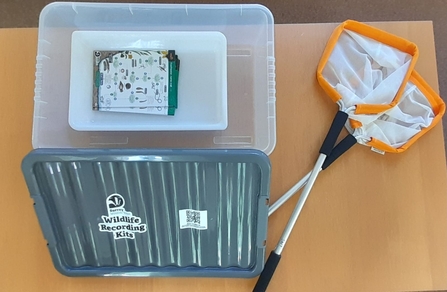
Download/print the guide for safe usage:
Download/print the Risk Assessment Template to adapt for your own use:
What's next?
Undertake further surveys such as...
- Freshwater Habitats Trust: National Pond Survey
- Freshwater Habitats Trust: PondNet Surveys
- Freshwater Biological Association: Riverfly Partnership
- British Dragonfly Society: Dragonfly Survey Guidance
- British Dragonfly Society: Migrant Dragonfly Project
- Freshwater Habitats Trust: Adult dragonflies survey for PondNet
Invertebrates
The kit will allow you to conduct sweep netting surveys and direct searching. Insects play a vital role in underpinning many day-to-day ecological processes. Surveying invertebrates can help inform conservation and land management decisions that are best for wildlife.
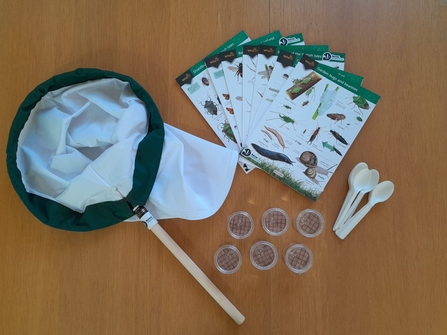
Download/print the guide for safe usage:
Download/print the Risk Assessment Template to adapt for your own use:
What's next?
Once you’ve undertaken these initial surveys, we’d recommend you move on to undertake the following surveys - these may take a little longer and may require you to regularly conduct the survey:
- Butterfly Conservation: Big Butterfly Count
- Butterfly Conservation: Garden Butterfly Survey
- UK Butterfly Monitoring Scheme: Traditional Butterfly Transects
- Natural History Museum: Nature Overheard Survey for those in urban areas
- People’s Trust for Endangered Species: Stag Beetle Count
- Polli:Nation Survey This survey encourages you to look at existing pollinator habitats in your area. Once you’ve made some improvements to your site, you can undertake the survey again to understand the impact of the improvements.
- Great Stag Hunt Record any sightings of stag beetles you find on your site.
- UK Ladybird Survey Record any sightings of ladybirds you find on your site.
- British Dragonfly Society: Dragonfly Records Record any sightings of dragonflies you find on your site.
- Build a bee hotel to provide a nesting site: https://www.surreywildlifetrust.org/actions/how-make-bee-hotel
- Create a wild patch or mini meadow to encourage more pollinators to your site: https://www.surreywildlifetrust.org/actions/how-grow-wild-patch-or-mini-meadow
- Follow this advice to attract more bumblebees to your site: https://www.surreywildlifetrust.org/actions/how-attract-bumblebees-your-garden
- Follow this advice to attract more butterflies to your site: https://www.surreywildlifetrust.org/actions/how-attract-butterflies-your-garden
- Follow this advice to attract more bees and pollinators: https://www.surreywildlifetrust.org/actions/best-plants-bees-and-pollinators
- Grow some wildlife friendly herbs to attract more pollinators: https://www.surreywildlifetrust.org/actions/grow-wildlife-friendly-herbs
- Make a log shelter to provide homes for beetles and other minibeasts: https://www.surreywildlifetrust.org/actions/how-make-log-shelter
- Build a bug mansion to provide your minibeasts with somewhere to shelter: https://www.surreywildlifetrust.org/actions/how-build-bug-mansion
Small Mammals
This kit provides you with simple plastic tunnels that contain some tempting food, inkpads and paper, so that when a mammal comes to investigate the food, they leave inky footprints behind.
Footprint traps are a fantastic way of discovering which mammal species live in your neighbourhood or garden. By knowing what you have on your site, can help you make better decisions on what actions to take to help nature.

Download/print the guide for safe usage:
Download/print the Risk Assessment Template to adapt for your own use:
What's next?
By monitoring the small mammals on your site, you have valuable information that can help you make decisions about how to improve the area and support wildlife such as hedgehogs. The recorded footprints will determine what steps you take next.
If you have hedgehog footprints:
- Record any hedgehog records or sightings on the Hedgehog Hotspots webpage at: www.surreywildlifetrust.org/record
- If you’ve seen a hedgehog in your area, you might like to add your sighting to the Big hedgehog map, created by Hedgehog street: BIG Hedgehog Map
- Create hedgehog friendly habitat to encourage hedgehogs to visit.
- www.surreywildlifetrust.org/act-wildlife/wildlife-gardening/wildlife-gardening-advice/helping-hedgehogs
- Create hedgehog sized holes in the bottom of your fence so they can easily visit your patch.
- https://www.surreywildlifetrust.org/actions/how-create-hedgehog-hole
If you have mice footprints:
- Consider creating a small area of woodland to provide additional habitat. https://www.wildlifetrusts.org/actions/how-make-woodland-edge-garden-wildlife
Soil
This kit enables you to test the soil pH, moisture and light levels. Knowing the type of soil you have on site is very important as it determines what plants and wildlife will thrive and will help to inform your management of the site as well.
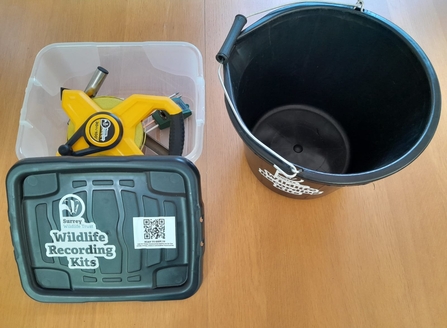
Download/print the guide for safe usage:
Download/print the Risk Assessment Template to adapt for your own use:
What's next?
Check you findings by looking at the type of soil you have in your area on DEFRA’s MagicMap: https://magic.defra.gov.uk/MagicMap.aspx
Plants
This kit provides you with the equipment to undertake plant surveys. Conducting a plant survey can help you gain insights into the species that exist in your area and can help you work out the best management regimes for your green space. Knowing the plant life in your area can also help you identify the potential invertebrates that inhabit it. For example, most butterflies have specific food plants. Recording all this information can be useful when preparing management plans.
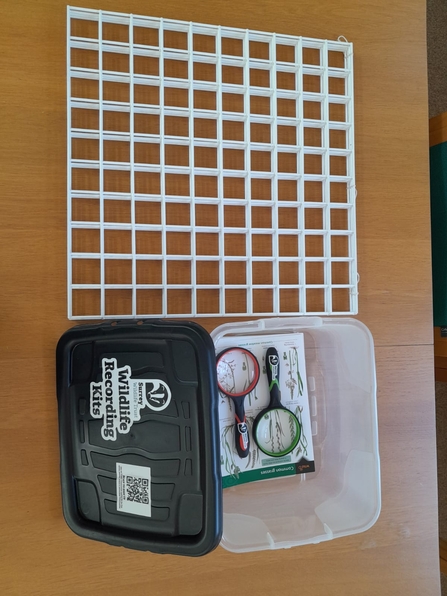
Download/print the guide for safe usage:
Download/print the Risk Assessment Template to adapt for your own use:
What's next?
Check out what other surveys you can undertake, and what species to look out for:
- Nature's Calendar (woodlandtrust.org.uk)
- National Plant monitoring Scheme Welcome! | National Plant Monitoring Scheme (npms.org.uk)
Moths
This kit provides you with a moth trap which involves the use of an artificial light source to attract moths during the night. In a moth trap the bulb is suspended over a box into which the moths fly, and from where they can be examined and identified before being safely released. Moths play an important role in ecosystems as herbivores, pollinators and as prey for other animals. Monitoring moths can help us to determine how biodiverse our sites are and can support decision making in regards to future actions.
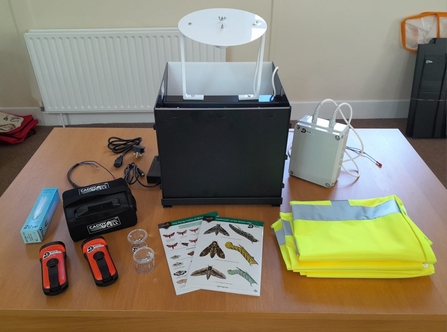
Download/print the guide for safe usage:
Download/print the Risk Assessment Template to adapt for your own use:
Download/print the User Manuals:
What's next?
- Follow this advice to attract more bees and pollinators: https://www.surreywildlifetrust.org/actions/best-plants-bees-and-pollinators
- Find out how to attract more moths to your site: https://www.surreywildlifetrust.org/actions/how-attract-moths-and-bats-your-garden
- Record your sightings by sending them to our local record centre - Surrey Biodiversity Information Centre (SBIC) or uploading them using apps such as iRecord.

© Emma Bradshaw
Booking a kit
You can borrow our kits by booking them through the Library of Things websites. We have kits hosted by Guildford Library of Things, and hosted by Godalming Library of Things. Please select where you would like to loan the kits from and check they have it available when booking. Please follow the T&Cs of the relevant Library of Things. Alternatively, you can also borrow a kit directly from us and collect it from our Pirbright HQ. Please read our Hire Agreement before loaning a kit directly from SWT.
Kits can be booked for 1 or 2 weeks at a time. You are responsible for collecting and returning your kit(s) in their original condition. Please follow the accompanying guides provided with each kit - guides can be viewed under the dropdowns above. If you have any questions about the kit, please contact the Communities team via the contact information at the bottom of the page.
FAQs
How do I start borrowing?
You can borrow any of our kits by booking them through the Library of Things websites, or you can borrow them directly from us and collect the kits from our Pirbright HQ. Please select where you would like to loan the kit from and check they have it available when booking. Before loaning the kit, please read the T&Cs of the relevant Library of Things, or the SWT Hire Agreement, depending on who you loan the kit from.
Book via ZERO Carbon in Guildford
How far in advance do I need to book the kit?
We ask that you give us at least three days' notice to borrow the kits. Please note that we only have limited equipment and if it has already been booked out, you will need to be flexible with dates.
Where do I collect my items from, and how do I return the kit?
The kits will need to be collected from, and returned to, Guildford Library of Things, Godalming Library of Things, or SWT Pirbright HQ, depending on who you loan the kits from. The kit will then need to be dropped back to the same location you picked it up from. When the kits are returned, they will need to be cleaned and returned in the same condition they were received in.
Does it cost to borrow the kit?
The kits are free to borrow.
Please follow the Hire agreement to borrow the SWT Pirbright kit.
Please follow the T&Cs of the relevant Library of Things, which can be viewed on their websites.
What can I use the kit for?
The kit can be used to monitor wildlife in your area. Understanding what lives in your green space, or the surrounding area, can help you make informed decisions and help protect nature.
If you do not own the land, please ensure you seek the landowner’s permission to undertake surveying.
I don’t know how to use the kit, can you help?
We provide a ‘how to’ guide with each kit, please refer to this in the first instance. If you need further assistance, please get in touch with us at communities@surreywt.org.uk and we will do our best to help you.
Who can borrow the kits?
These kits can be borrowed by any Surrey-based community group.
Can I extend my booking?
Yes, you can! However, this is only possible if the kit has not already been booked out. Please check with the Library of Things or Communities team, depending on who you loan the kits from.
What do I do if an item is damaged, missing or not working properly?
Our kits hosted by The Library of Things are checked regularly by maintenance volunteers, and our Pirbright kit is checked by SWT staff, however, if something doesn't seem right, please stop using the item and contact the original lender.
Before loaning the kit, please read the T&Cs of the relevant Library of Things, or the SWT Hire Agreement, depending on who you loan the kit from.
Do you charge for late returns, damage or lost kits?
We understand that mistakes can happen and we are careful not to charge people unfairly. However, we may charge a repair fee or up to the full replacement cost of the item if it has been lost, used improperly or unreasonably damaged. To find out more, please see the full terms & conditions, depending on who you loan the kits from.
For the SWT Pirbright kit, please see our Hire agreement for further details.
We do not charge late fees at this time, however, if you are going to be late returning the kit, please contact the original lender in advance, as others may have items booked and be affected.
For either of the Library of Things, please see their terms and conditions, which can be viewed on their websites.
Additional queries
If you have any questions about the kit, please contact the Communities team at communities@surreywt.org.uk.

